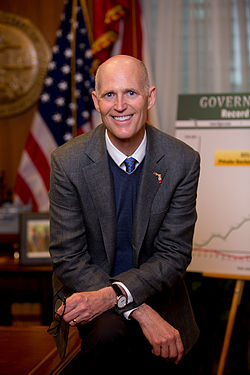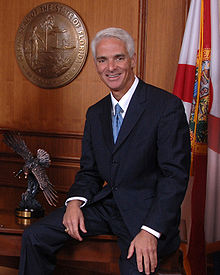You have /5 articles left.
Sign up for a free account or log in.
A tight gubernatorial race in Florida has included a back-and-forth battle over who can claim pro-higher-education bragging rights.
Both candidates -- Republican incumbent Rick Scott and Democratic convert Charlie Crist -- have been working for months to paint themselves as an ally to students, parents and teachers. Those efforts have included claims of financial support for college students and the cash-strapped state university system, where universities saw several straight years of budget cuts prior to 2013.
In attack ads, Scott claims he kept higher education affordable, while Crist allowed tuition increases. Crist, meanwhile, points the finger at Scott for cutting millions from university budgets while Crist says he supported more students through the state’s merit scholarship program, Bright Futures.
In reality, both have overseen tuition increases at Florida universities in their respective years as the state’s governor. Both have vetoed tuition increases. Both have signed off on tightening the eligibility requirements of the Bright Futures program.
“Both of them are trying to claim credit and cast blame on the other candidate,” said Carol Weissert, a political science professor at Florida State University. “And it’s interesting, because higher education isn’t generally part of that debate.”
The good news is they're talking about higher education, when most gubernatorial campaigns don’t, Weissert said. The bad news is, with all the mudslinging going on, it’s hard for voters to know what’s true.
Scott's Tenure as Governor
Scott, a wealthy former healthcare executive who was unknown in Florida politics prior to 2010, started ruffling the feathers of higher education groups within a year of being elected.
He has questioned the usefulness of liberal arts and social science degrees and talked about shifting money away from those programs toward STEM fields. He called out anthropologists in particular, saying the state doesn't need any more of them -- and his statements made him a symbol to many arts and sciences professors nationwide of government uninterest in their fields. He allowed a new university to be built, Florida Polytechnic University, despite concerns that the university system already had a large enough burden with its 11 institutions. He approved roughly $300 million in cuts to the university system in 2012, though that sum, plus more, was returned to the budget the following year.
 He also pushed for the state’s colleges -- formerly community colleges -- to offer $10,000 four-year degrees, focusing on fields with high demand and high-paying jobs. And he signed a law encouraging schools and colleges to use massive open online courses, arguing that they are a more efficient way to offer education.
He also pushed for the state’s colleges -- formerly community colleges -- to offer $10,000 four-year degrees, focusing on fields with high demand and high-paying jobs. And he signed a law encouraging schools and colleges to use massive open online courses, arguing that they are a more efficient way to offer education.
“How interested is Rick Scott in higher education?” United Faculty of Florida President Tom Auxter asked. “He’s very interested in it – in transforming the whole thing into something you that don’t pay much to do.”
The faculty union has endorsed Charlie Crist and is encouraging members across the state to vote next month.
Auxter, who’s a philosophy professor at the University of Florida, criticized the governor’s championing of $10,000 degrees, saying it cheapens the state’s higher education.
“You scale down everything and you end up with a kind of Wal-Mart of higher education where it’s just what’s on the shelf at that moment,” he said. “You hire whatever teachers you need at the last minute to teach the courses for that semester. There’s no quality to the courses, there’s no continuity.”
The state faculty union is focused on highlighting two major issues during the campaign: the politicization of Florida’s universities under Scott and performance funding for universities.
For the first, Auxter said, Scott has used all his appointments to university board of trustees to fill them with people who think exactly like him.
To be sure, all executives tend to appoint board members who align with their partisan beliefs. But Auxter said Scott has taken it one step further, by questioning each appointee to see whether they agreed with his line of vision and whether they agreed with the parts of Texas Governor Rick Perry’s plan for higher education that Scott has praised.
Auxter cited the recent appointment of state politician John Thrasher as the president of Florida State University as another example of politicization, saying it should come as no surprise that the university’s trustees, most of whom were appointed by Scott, selected Thrasher.
As for the union's second focus, eight of Florida’s universities will split about $188 million in performance funding this year, based on their scores on 10 factors defined by the legislature, including the cost of a degree, graduation rates and graduate salaries.
The universities split $20 million in performance funding last year, but this is the first time that the universities at the bottom of the list -- New College of Florida, Florida Atlantic University and University of West Florida -- stand to lose money based on their scores. If the universities don’t make improvements this year, they could lose a combined $11.9 million.
"We never before said, ‘Let’s trash some universities so we can make others better,’ and that’s what’s happening with performance funding,” Auxter said.
Auxter said the focus on graduation rates could disadvantage urban universities, which tend to have higher populations of adult learners who aren't taking classes full-time and therefore take longer to graduate. He isn't the only one to question the performance-based system. Some have argued that the ways to earn points are unfair since, for example, students who get jobs outside of Florida or attend international graduate programs aren't counted.
Crist's Background
Crist, for his part, has done everything he can to make education a focal point of his campaign against Scott. A former state education commissioner under Republican Governor Jeb Bush, Crist was elected governor in 2007 before stepping down to run a failed bid for U.S. Senate in 2010.
He does have some bona fide education backing based on his record as governor, such as a veto of a merit pay proposal for teachers in 2010. (Scott signed a similar proposal into law a year later.)
 But in terms of higher education, Crist also vetoed a 5 percent tuition increase and denied support of a proposal to allow the state’s largest universities more flexibility in increasing tuition during his first year in office. At the time, higher education advocates were pleading for more money for a system they called underfunded. A few months later, Crist had a change of heart and agreed to the increase.
But in terms of higher education, Crist also vetoed a 5 percent tuition increase and denied support of a proposal to allow the state’s largest universities more flexibility in increasing tuition during his first year in office. At the time, higher education advocates were pleading for more money for a system they called underfunded. A few months later, Crist had a change of heart and agreed to the increase.
He also later pushed for a plan that allowed varying tuition increases at different universities, as long as they didn't top 15 percent. The increases would be allowed until Florida's tuition rate reached national average. It still hasn’t -- the 2013-14 average four-year tuition for Florida was $6,336, while the national average was $8,893, according to the College Board. Florida has the eighth lowest.
Yet that system of differential increases is no more, after Scott, who vetoed a tuition increase in 2013, signed a law this year that eliminates automatic tuition increases for inflation and limits increases to 6 percent. (The law’s primary purpose was to give in-state tuition to undocumented immigrants who graduated from Florida high schools.)
In talking about the faculty union's support of Crist, Auxter described him as a "fast learner" who's evolved into a politician who cares about higher education. He spoke about a large meeting Crist organized during the end of his time as governor, in which the state's university, college and business leaders gathered to brainstorm ways to improve the system by working together. Crist left office before the ideas from that meeting could be put in place, Auxter said.
“I don’t think it’s a bad thing when politicians change their views and they announce it publicly,” he said. “I think that means maybe they grew a little bit.”
Higher Ed Agendas
If Scott is worried by the way the state’s faculty union has responded to many of his higher education decisions, his campaign materials don’t show it.
He touts his leadership in securing money for performance funding, and says in his “Let’s Keep College Affordable" plan that he’ll work to create a similar system for the 28 colleges in the Florida College System.
Scott says he’ll use a second term to reduce the cost of textbooks and require colleges to post the cost of instructional materials for each course before registration. He wants to ensure that colleges and universities publicly share information about proposed cost increases. He’ll also continue his focus on STEM fields, by seeking money for workforce training for STEM jobs and enhancing the $10,000 bachelor’s degrees in STEM fields at the state’s colleges.
On Crist’s side, his "Fair Shot Florida" campaign includes a plan to increase Bright Futures awards, which cover a percentage of a student's tuition based on their standardized test scores and community service hours. Crist wants to open up the eligibility so that 180,000 students can receive scholarships, and says those changes will add $190 million to the program. (In the 2012-13 year, 162,980 students earned awards.)
When Crist was governor, the legislature passed a bill to slightly reduce the amount of money students received and drafted tougher standards to earn scholarships. Those efforts continued to a greater degree under Scott, resulting in a reduction in the number of students who qualified.
Crist also wants to create a loan forgiveness program for university and college students who work in high-demand fields and create a student loan refinancing authority to help young graduates manage their debt.
He plans to push for tuition-free graduate degrees for experienced teachers of STEM subjects and to increase financial support for needy students.
Crist's ideas may sound appealing to higher education advocates and students, but it’s unclear how easy it would be for him to find funding for those initiatives with a state legislature that’s unlikely to budge from Republican control.
Campaign spokesmen for both Scott and Crist did not offer details when asked about their proposals. Scott campaign spokesman Greg Blair said he was not surprised the union had endorsed Crist.
Weissert, the political science professor, said she doesn’t think either candidate has a significant advantage on higher education issues. And while it’s refreshing to see higher education play a role in the campaigns, she doesn’t think it will be a deciding factor in who gets elected.





